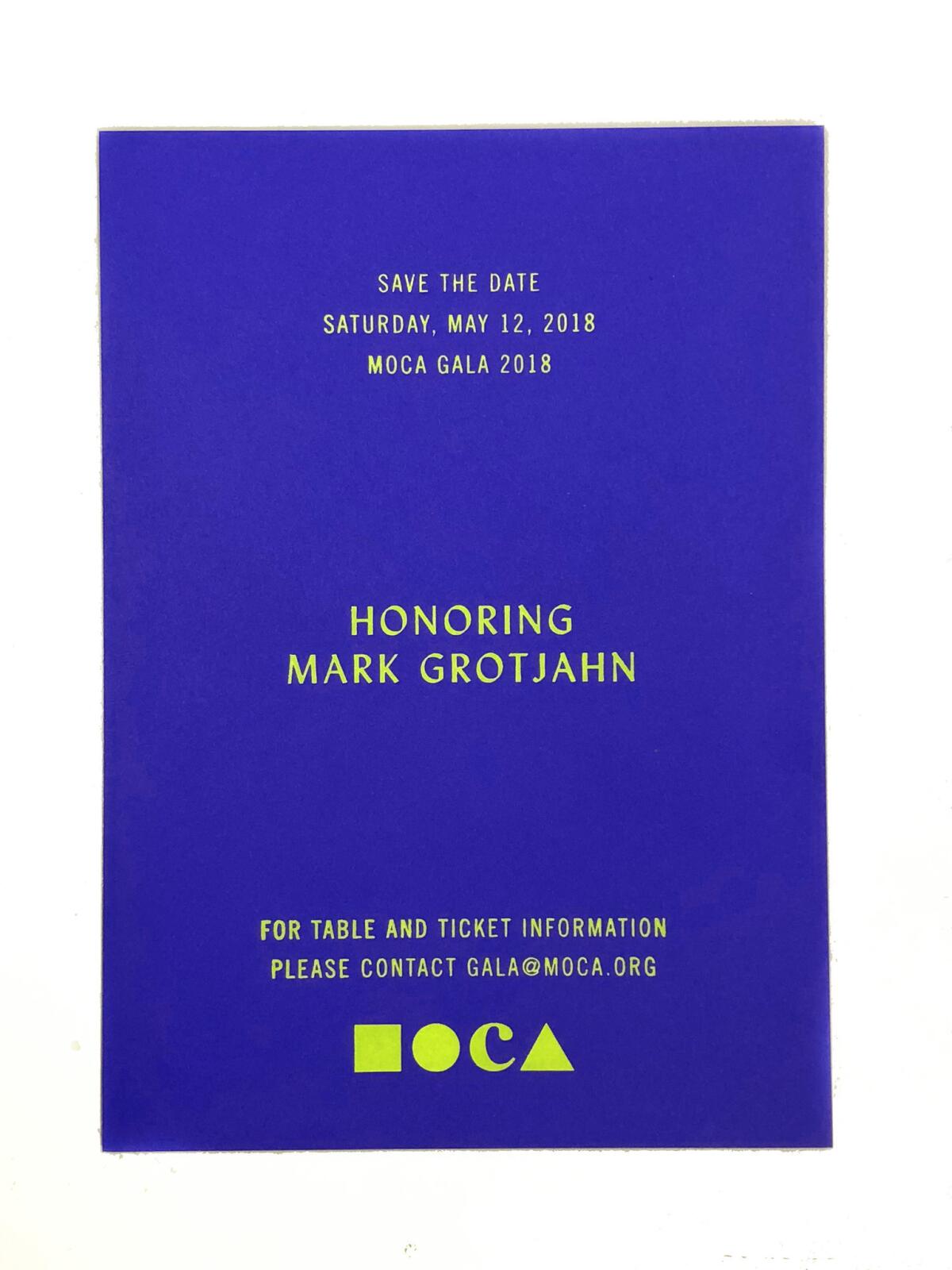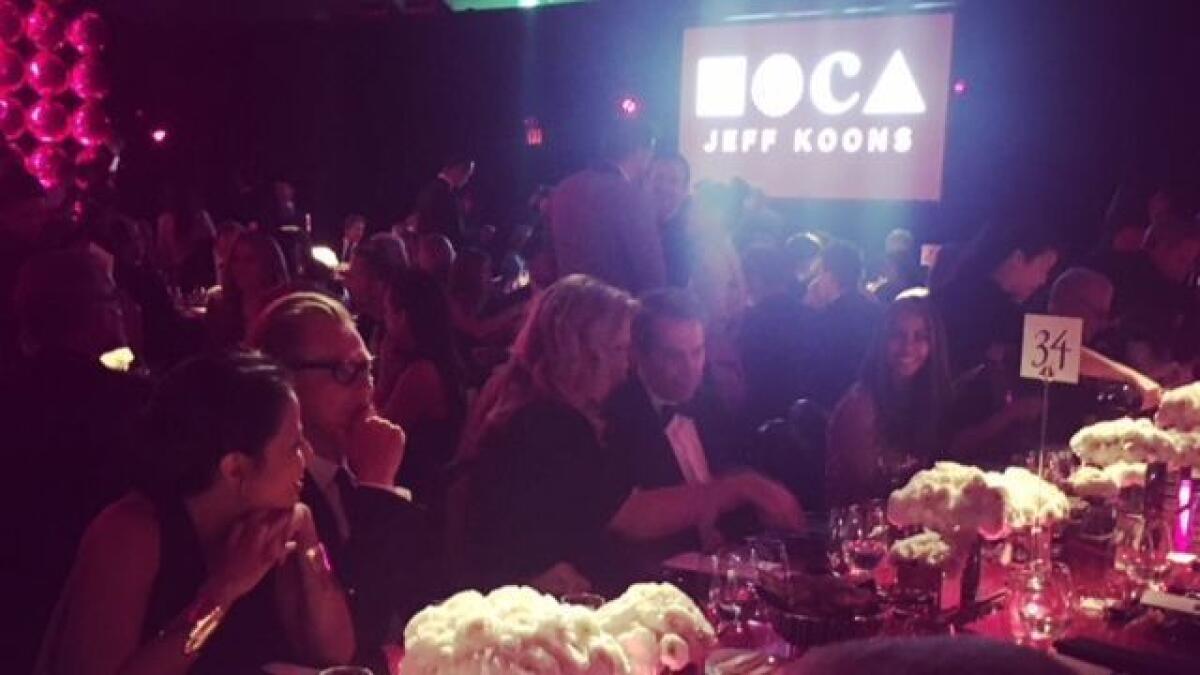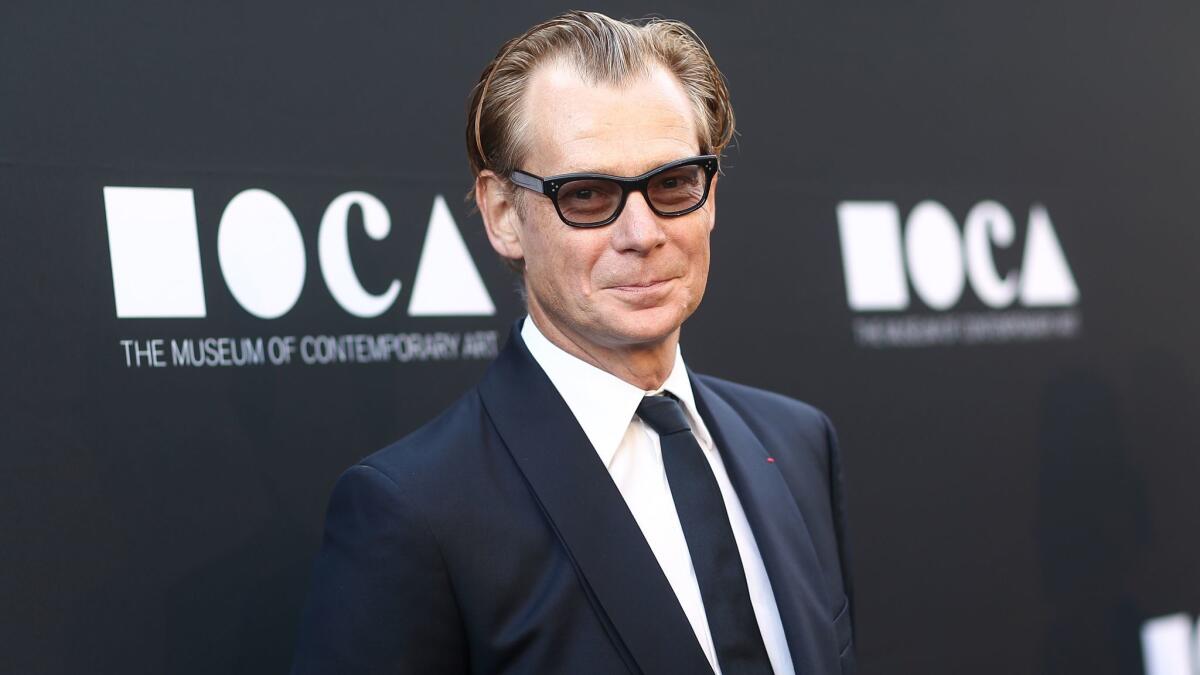Mark Grotjahn declines a MOCA honor, and an art gala turns into a deeper discussion about inclusivity
A party is just a party — until it’s far more than that.
The Museum of Contemporary Art recently mailed May 12 “save the date” invitations to its 2018 gala honoring one of its artist board members, Mark Grotjahn.
But Grotjahn, who agreed to be honored last year, has since declined to accept the award. His reason: a lack of diversity in the museum’s recent gala honorees, who have been straight, white men — Jeff Koons last year and before that, Ed Ruscha and John Baldessari.
The Grotjahn news lands at the same time that artist Lari Pittman, who is gay and Latino, confirmed to The Times that he resigned his seat on the MOCA board about two weeks ago.
Grotjahn didn’t respond to requests for an interview, but The Times did obtain text from a statement he sent about three weeks ago to board co-chair Maurice Marciano that read:
“Since the day you extended your invitation to me, our country and the world have changed in ways that were difficult to anticipate.There is a new urgency to change the power dynamic and we have an opportunity to do so."

MOCA Director Philippe Vergne said he had discussed this year’s honoree and the idea of diversity with Marciano and board co-chair Lilly Tartikoff Karatz, but that ultimately the decision to honor Grotjahn was theirs. Vergne said Grotjahn was “totally worthy of being the honoree,” but he respected the artist’s decision to decline.
“My response to him was: ‘We decided to honor you before and it’s our duty and pleasure, now, to honor your ideas,’” Vergne said.
“I remember our first conversation, and Mark said the reason he accepted was because it would give him an opportunity to step up to the podium, in front of all these people — philanthropists, other artists — and talk about MOCA and how important it has been for his generation of artists and other generations of artists,” Vergne said. “It was out of pure love. He wanted to help MOCA. Then he realized maybe the best way to help MOCA, today, is to invite a conversation that would promote a different model for the gala, so that the gala could better reflect what’s happening in the world — and in the program at MOCA.”
MOCA said it is rethinking its gala and will send out a new announcement in the next few weeks.
Like most museums, MOCA stages the gala as its biggest fundraiser of the year. With the goal of selling tickets — which at MOCA start at $2,500 for individuals and run to $100,000 for a table — museums typically choose big-name honorees to fill seats. LACMA’s 2017 Art + Film Gala honored George Lucas and Mark Bradford. The Hammer Museum’s 2017 Gala in the Garden honored Ava DuVernay and Hilton Als. The first official MOCA gala was in 2001, but the honoring of individual artists didn’t begin as an annual practice until 2015, with Baldessari.

Pittman said he respects Grotjahn’s work, but felt the board was not casting a wide enough net for honorees. Years ago he sent an email to Vergne listing about 15 possible honorees, including Betye Saar and Kerry James Marshall, but Pittman was dismissed, he said, adding that he otherwise has good communication with Vergne.
Pittman said he and other board members weren’t consulted about this year’s gala. He learned of the decision to honor Grotjahn when he received his “save the date” card.
“What my resignation implies is an individual and personal vote of no confidence in the relationship between the board and the director and the director and the board, between the board and the curatorial team and between the directorship and the curatorial [team] — in other words, it’s in every direction,” Pittman said. “It’s a vision problem in what the board wants, what the director wants and what the curatorial team wants. Their visions are very different. I’m leaving because I don’t see any current resolution given all the players.”
For Pittman, institutional inclusivity is a deeply personal issue.
“I’m 66, and when I came out of the closet in ’71 it wasn’t easy,” Pittman said. “And I’m Latino — my first language is Spanish. It gives you a perspective in life. I’ve gotten some privilege in the art world, and rewards, and that’s been wonderful. But that perspective — of lack of inclusiveness, of not casting a big enough net — never leaves.”

My response to him was: ‘We decided to honor you before and it’s our duty and pleasure, now, to honor your ideas.'
— MOCA Director Philippe Vergne, on his message to artist Mark Grotjahn
Vergne said Pittman’s decision to step down from the board was “painful.”
“But I also fully respect it in the same way I respect Mark Grotjahn for the decision he’s made,” Vergne said. “They’re actions being taken because they’re artists who want to see changes made in the world and in the institutions that they love.”
MOCA’s exhibitions have included 2017 solo shows for African American artist Marshall and for Latina artist Anna Maria Maiolino. “Axis Mundo: Queer Networks in Chicano Art” showed at MOCA’s Pacific Design Center satellite last year, and the main Grand Avenue location has installed a new mural by Nigerian-born Njideka Akunyili Crosby. This spring it will exhibit an installation commission by Lauren Halsey, a black artist from L.A.
The programming has been well received: Attendance jumped about 21% from 2016 to 2017, the museum said.
“The curators here have brought to this program a sense of inclusiveness and diversity that I think is really radical,” Vergne said. “And for me, it’s important that these programming decisions are reflected in our gala.”
In 2012 artists Catherine Opie, Barbara Kruger, Baldessari and Ruscha all resigned from the board protesting the vision of then-director Jeffrey Deitch. In 2014, after Vergne was named director, all of the departed artists but Ruscha rejoined the museum’s board. Later that year, Bradford and Grotjahn joined the board, and Pittman joined in 2015.
MOCA is planning a retrospective of Grotjahn’s work for 2020.
Follow me on Twitter: @debvankin
The biggest entertainment stories
Get our big stories about Hollywood, film, television, music, arts, culture and more right in your inbox as soon as they publish.
You may occasionally receive promotional content from the Los Angeles Times.




